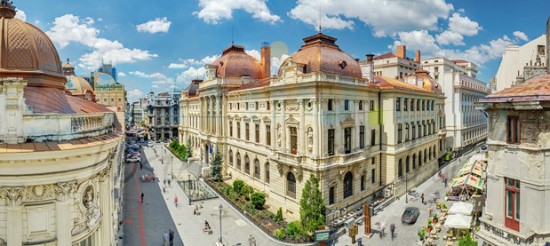Bucharest Criticised for ‘Profligate’ Beautification Spending
Thousand-euro park benches and rubbish bins made of exotic wood are just some of the overpriced items bought by Bucharest authorities in recent years, auditors said.
The Bucharest municipality spent around 600 million euro between 2007 and 2014 to establish and maintain green spaces in the city but a lot of the money was wasted on unnecessary purchases, according to a report from national audit office Curtea de Conturi. The expenditure includes seven million euro for redecorating the pavements on one of the main boulevards in Bucharest, with most of the money spent on installing coloured concrete structures, ornamental granite paving, lights and fences. But the municipality only spent 1.5 million euro to establish the green spaces on the boulevard.
District 3 was the most profligate of the six districts in Bucharest. The city hall paid more than 1,000 euro for each park bench it bought, while also paying some 8,200 euro for 13 rubbish bins made of exotic wood. The audit office inspectors found out that the municipal authorities often overpaid for their purchases. “We have noticed that city halls purchased flowers and other plants and trees from different companies at prices significantly higher than regular prices on the market,” Curtea de Conturi said in its report.
District 3 city hall paid 68 euro for chrysanthemums, while the price at a producer was less than three euro. For a lime tree, it paid around 550 euro, ten times more than the average price. The audit office found out that after the outsourcing of services for cleaning parks, costs rose dozens of times compared to the period when the service was carried out by the city hall.
Despite the large amounts of money spent on green areas in Bucharest, their surface area has reduced significantly in recent years. Bucharest had only 9.86 square metres of green space per capita in 2012, compared to 23.21 square metres per capita in 2007, according to official data. EU standards say Romania should have a minimum 26 square metres of green space for capita.
Because of land restitutions, including in parks, and the mismanagement of public spaces, the area of green space in Romania’s capital fell from 3,200 hectares in 2007 to 2,080 hectares in 2014. Corruption in Bucharest’s municipalities is a significant problem, with four out of six district mayors in the capital are currently under arrest or being investigated for graft. The mayor of Bucharest, Sorin Oprescu, was also arrested in September last year on suspicion that he took bribes of around 25,000 euro from several companies in exchange for getting them contracts with the city hall.
Romania is still considered one of the most corrupt states in the European Union and has made only limited progress in fighting corruption and organised crime since it joined the EU in 2007. But in recent years, the number of high-ranking officials sentenced for graft has increased significantly.
14 January 2016

